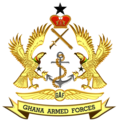References
- ↑ "Combat Supprt [sic] Arms". Gaf.mil.gh. Ghana Armed Forces. Retrieved 26 April 2014.
- ↑ Amenumey, D. E. K. (2002). "10". Outstanding Ewes of the 20th Century:Profiles of Fifteen Firsts. Volume 1. Accra: Woeli Publishing Services. pp. 119–129. ISBN 9964-978-83-9.
| Leadership | ||
|---|---|---|
| General | ||
| Services | ||
| Independent | ||
| Departments in the Ministry of Defence | ||
